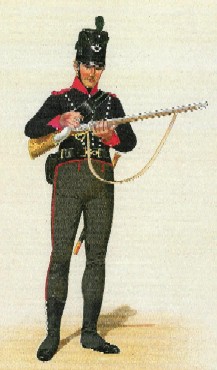Our sites:
Home
of
Access Heritage Inc (formerly The Discriminating General)
The Napoleonic Wars Collection
Military Music Sound Clip Gallery
Products and Services:
British Army Products 1793-1815
British Army Products 1816-1856

Articles - Reenactments and Units - Book Reviews - Quizzes - Replicas - Links - Chart of British Regiments - Sound Clips - Prints for Sale - Animated GIF Battles - Chronology of Events - Video Clips
Raising of the 7th Battalion of
the 60th Regiment for North America
Submissions by Keith Raynor
and René Chartrand

Rifleman of the 5th Battalion 60th Regiment,
1814-15,
print after P.W.Reynolds (courtesy R. Chartrand)
The following document from Mr Raynor illustrates the plan behind the raising of the 7th Battalion, 60th Regiment. Following this are notes from an 1814 inspection return of the Battalion provided by Mr Chartrand which shows how well this plan worked.
This Battalion was dressed in green uniforms like riflemen of the 5th Battalion but were armed with muskets; with the exception of two rifle companies attached to the battalion. While they were armed with muskets they did receive special permission to wear their bayonets off black waistbelts like riflemen. Arriving in Halifax in April 1814, the Battalion saw service in the expedition to Penobscot, Maine. This expedition ended with the capture of Fort Castine and British control of most of Maine until peace was signed. The Battalion remained in Halifax until 1817 when it was disbanded. - Robert Henderson
Horse Guards 2nd August 1813. ( P.R.O. Kew WO 1/656 Pages 151 and 152 )
"My Lord, Adverting to the communications I held with your Lordship some months ago, upon the expediency of raising a 7th Battalion to the 60th Regiment, from amongst the Prisoners of War who are nations of Germany. I have now to bring that subject under your favourable consideration, in consequence of the arrangements having been completed, which were then in agitation, for classing the Prisoners according to their respective nations, and by which it appears that there are ready 1200 eligible subjects who may be applied to this service.
Under the existing exiquences of the service in North America, I have to propose that this Battalion should be raised for the service of that country, and with a view of giving them an interest in the Military Service of Great Britain, which they might not otherwise feel, it may probably come within your lordships favourable consideration to hold out to the men the eventual grant of land in Canada after a service of five years.
It will of course be necessary to give these people the usual Bounty of four Guineas per man.
I am, my Lord, yours, Frederick, Commander in Chief.
( To ) The Right Honble. Lord Bathurst"
An inspection of 7th Battalion, 60th Foot in Halifax, Nova Scotia, in June 1814 found that the NCOs were " well chosen & are attentive to their duty…but unfortunately many…cannot read English." The linguistic divide showed itself especially on the parade square. The inspecting officer reported: "…in due time…they will be perfect… Almost the whole of the men being unacquainted with the English language makes the task of drilling them very difficult to the officers."
Not only was language a barrier to them learning drill but the long years serving in Napoleon's German corps also created challenges: " A tolerable good body of men, their appearance is healthy & clean. ...greater part have been drilled in the French manner & it is difficult to break them of habits that they have contracted in that service…"
Copyright: Unless otherwise noted, all information, images, data contained within this website is protected by copyright under international law. Any unauthorized use of material contained here is strictly forbidden. All rights reserved.

